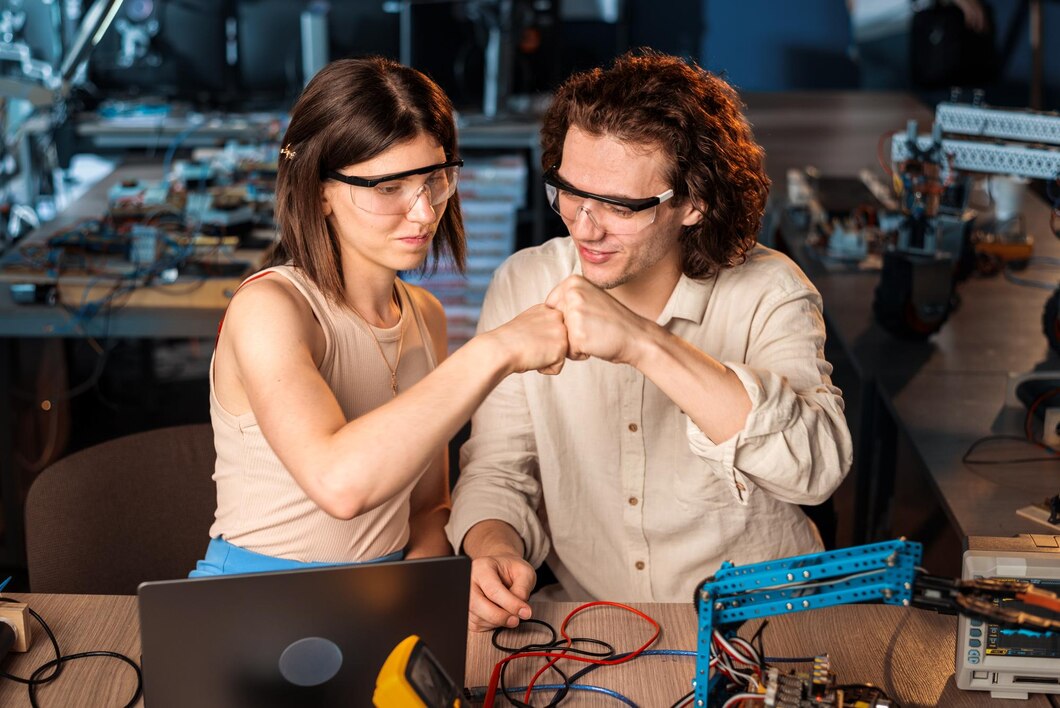Jan 9, 2025 | Makeblock
Each mid-February, you can witness celebrations of George Washington's birthday, but a significant part of the celebration honors his achievements in engineering. It is from his contributions to American infrastructure and his military engineering expertise that Engineers Week, established in 1951, has been held annually to recognize all contributions that engineers make to society and inspire the next generation of engineers.
Today, Engineers Week has become a culmination of a year-round portfolio of student programs and competitions, and diverse celebration activities for all to participate. In this introductory article, you can navigate through Engineers Week's definition, importance and some recommedations to inspire your own program and creation.
What is Engineers Week?

Engineers Week (E-Week) is one of the largest STEM events of the year in the United States. Organized by the backbone organization DiscoverE, E-Week is celebrated the week of Washington's birthday, each mid-February since 1951, in honor of the first president's background as the nation's first engineer and land surveyor. This event aims at celebrating the amazing accomplishments of engineers, technicians, and technologists and to introduce K-12 students to engineering and technology.
Each year, it unfolds under a unique theme, which serves as a guiding light for all the events. All recent themes consistently place a strong emphasis on the future, calling on individuals—especially young minds—to embrace their potential, to think beyond the present and imagine a future where technology, sustainability, and innovation work in harmony, and to shape a future where engineering plays a central role in transforming the world.
Why should we celebrate E-Week?

The reason that we celebrate E-Week lies in the important role of engineers play in shaping society, providing the innovative solutions that drive progress and improve quality of life. From infrastructure, transportation to technology and healthcare, engineers lay the foundation for development and solve some of the most pressing challenges of our time. E-Week offers a comprehensive platform from the following 3 perspectives to recognize these contributions, while prompoting and inheriting them in a broader population.
1. Celebrating Engineering Achievements: E-Week celebrates the remarkable accomplishments of engineers in areas such as technology, infrastructure, sustainability, and innovation. From designing bridges and roads to developing cutting-edge AI technologies, engineers influence every aspect of modern life.
2. Inspiring the Next Generation: One of the primary goals of E-Week is to encourage young people, especially students, to consider careers in engineering. By showcasing the diversity of the engineering profession and its impact on daily life, the event helps spark interest in the field and encourages students to pursue STEM education.
3. Public Awareness: E-Week fosters a better understanding of the critical role engineers play in solving global problems such as climate change, health crises, and resource management. The celebration educates the public on how engineering improves safety, quality of life, and sustainability.
As guided by the great Washington, a nation should grow toward technical advancements, invention, and education. E-Week is such a program that creates a continuous flow of talent to ensure sustainable technical development.
How can we take part in E-Week?
Participate in official events

As the main organizer of E-Week, DiscoverE opens up several events throughout the week, including Future City Competition Final( which encourages students to use the Engineering Design Process and project management skills to showcase their solutions to a citywide sustainability issue)、Girls Day( which encourages educators to introuduce girls to engineering) and chats with some outstanding change makers. You can choose to attend according to your own interest and schedule.
Design your own engineering project
E-Week also strongly encourages everyone to design and participate in the activities in their own way, seizing the initiative of creation and engineering. E-Week is not just for people who already work in the engineering or STEM field. It’s for anyone with deep curiosity or a desire to learn and it wouldn’t be E-Week without exploring and doing some hands-on experiments. Your project can incorporate a wide range of ways how engineers change our planet-physical creation, software programming, engineering research, infrastructure building, and it's more ideal if they are appropriate for children to get involved.
Here are some example projects to inspire your own creation.
1. Reboost waste material
With your own imagination, design and operation, you can turn rough and even discarded materials into unique treasures. This project not only promotes environmental sustainability but also showcases the creative potential within engineering. When embarking on such a project, tools like a laser cutter can be invaluable. xTool P2S is such a desktop laser cutter that allows for precise and intricate cuts. It can help you process various materials such as leather, acrylic, and wood. Whether you want to make name tags, necklaces, lamps, or flower shelves, the laser cutter provides the means to bring your innovative ideas to life.
2. Design and build your own robot companion
Having a personalised robot companion is an exciting engineering feat that showcases your creativity and individuality. You can build its physical form accoring to your aesthetics and make it perform the actions you want through inputing commands. A robot kit like mBot Ultimate can offer you this rich building and playing experience. With its 10-in-1 particularity, you can experience the DIY charm by realizing remote car control, pitch, action photography, pouring wine and more.
3. Comprehend and operate programming progressively
With your own creativity, programming skills, and logical thinking, you can transform simple lines of code into interactive experiences that tackle core challenges in the real world. The mBot2 Rover Robotics Kit can break these complex programming problems into fun and accessible tasks. With its two-part structure of mBot2 and the Rover add-on pack and the accompanying software, it offers a perfect learning curve for children in progressive programming.
4. Investigate and improve energy use in shcool
Lighting, electronic appliances, heaters and ACs-you can research and improve energy use from many aspects in school, dedicating yourself to applying practical engineering mindsets to observe the environment, identify inefficiencies, and implement tangible changes. A toolkit like ENERGY STAR Energy Efficiency Student Toolkit would be an ideal assistant. These no-cost resources provide step-by-step instructions and simple management tools for you to revolutionize school's energy consumption, especially with a student team's participation.
5. Imagine and design a future city
To build up a promising future city or community where we live, you can be the chief designer to tackle the problem of infrastructure, social wellbing, environmental health and community connection. With the urban design toolkit by Greater Wellington government, you can fulfill these tasks by learning basic rules for urban planning and accomplishing some hands-on practices, cultivating the logical thinking and creative planning abilities.




